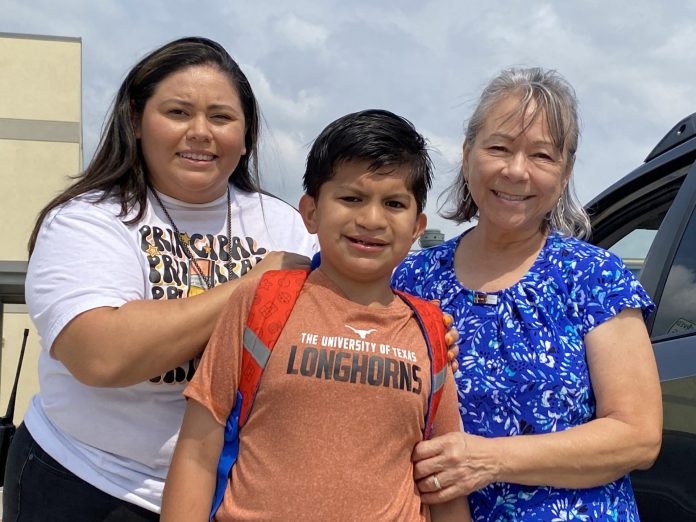
|
Only have a minute? Listen instead
Getting your Trinity Audio player ready...
|
HARLINGEN — Meet Sebastian.
He attends IDEA Academy Harlingen, has plenty of food to eat, clean clothes and a roof over his head.
The 11-year-old has proper medical care, he laughs, chatters excitedly at the finer things and the simpler things and the fabulous things in his life, and he enjoys his family life with Bill and Rose Armistead. And his six brothers and sisters and his nieces and nephews and …
When he came to live with the Armisteads at age 23 months, he was recovering from a fractured skull and a fractured arm. No doctors or surgeons had attended to his cleft lip and his cleft palate, and he did not have all of his immunizations. He couldn’t walk, and he spoke only two words.
Thankfully, the Armisteads came into his life, and they will remain in his life even after they’ve passed.
These tragedies make Child Abuse Prevention Month each April crucial toward highlighting more fully the importance of recognizing and protecting children enduring physical, sexual, and emotional abuse, as well as instances of neglect.
However, the monstrosities visited upon the very young happen every minute of every hour of every day. That’s why organizations like Blue Sunday Child Abuse Prevention, Valley Haven Inc., Sunny Glen Children’s Home, churches and school counselors remain always vigilant and ready to mobilize for the next child in crises.
The life of Sebastian Armistead shines as a candle of hope for any abused child, and proof of the grand possibilities when people come together to support a youngster in his journey toward goodness. In fact, when people rescue a child from such abusive circumstances, the salvation of that child and the joy of that child spreads to those around him.
Foster care and ultimately adoption saved Sebastian from his nightmare, and the Armisteads have never been happier.
“He became our seventh child,” said Rose Armistead. “We have six other children, and they are grown up.”
The father of her two sons died in his twenties. When she married Bill, they raised her sons and his four children together as their own.
“They all consider themselves brothers and sisters and they love our little one,” Rose Armistead said. “They’ve received him with open arms, even the grandchildren. I have granddaughters that are much older than him and they all love him.”
Foster care and adoption can mean the difference between a life of drug abuse, homelessness, and violence and a life of productivity, positivity, and belonging. It can be a bridge from which traumatized children can cross from insanity to clarity, from monstrosity to humanity, from the hopelessly broken to the glory of wholeness.
The wholeness of a life can be derailed in the formative time by all manner of abuses.
It happens everywhere and every day, but it doesn’t have to. These traumas can be avoided if only the right people are there at the right time to do the right thing. If no one intervenes, the tragedy continues, and its scars run deep throughout a person’s life, says Sylvia Gamboa, director of guidance and counseling for the Harlingen school district.
“It does carry into adulthood,” Gamboa said. “It can manifest into anxiety, depression, inability to form bonds in relationships, and it can affect their earning capacity in certain cases. I know there is a lot of research into that. And so it is important to try to get that care.”
It is a fine and grand thing that organizations and entities and individuals stand ready to help kids in crisis. But what happens after the intervention of the crisis? These organizations offer safety, but they don’t offer a sense of place or belonging. The only people who can offer that are families who can accept children as one of their own. That’s what foster care offers, and beyond that hopefully adoption.
And that’s what Bill and Rose Armistead offered Sebastian.
“We knew that he needed us,” Rose said. “I’m not saying just us, but we felt like we could give him what he needed. We were prepared because of all the other children we thought we could keep but never happened. They went with relatives or friends.”
The Armisteads brought with them a lifetime of experience raising their six children as they fostered more than 40 children over 13 years. Several of those children still keep in touch with the Armisteads, bringing a continued joy into their lives.
Rose Armistead recalls her son serving in the Army in Iraq and then Afghanistan and his family being in Germany and how fostering kids eased the fear and the loneliness.
“We just felt like we needed to be doing something to help others,” she said. “The truth is if I did something for someone else God was going to take care of my son and my grandchildren. So that was one of my big reasons. Then we just fell in love with doing it. And we kept doing it until we did adopt one of the children.”
And that child Sebastian.



